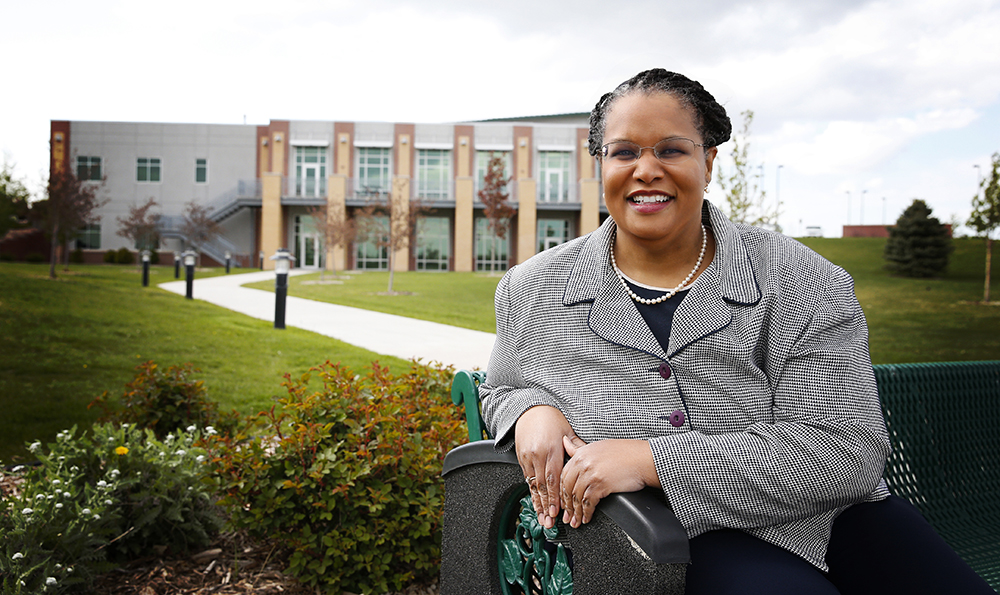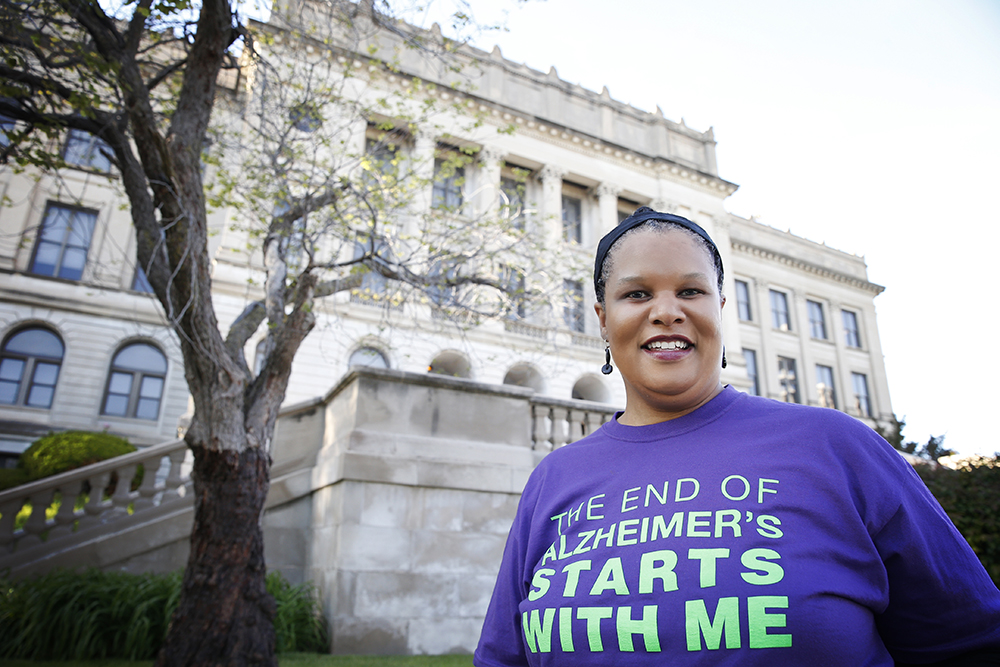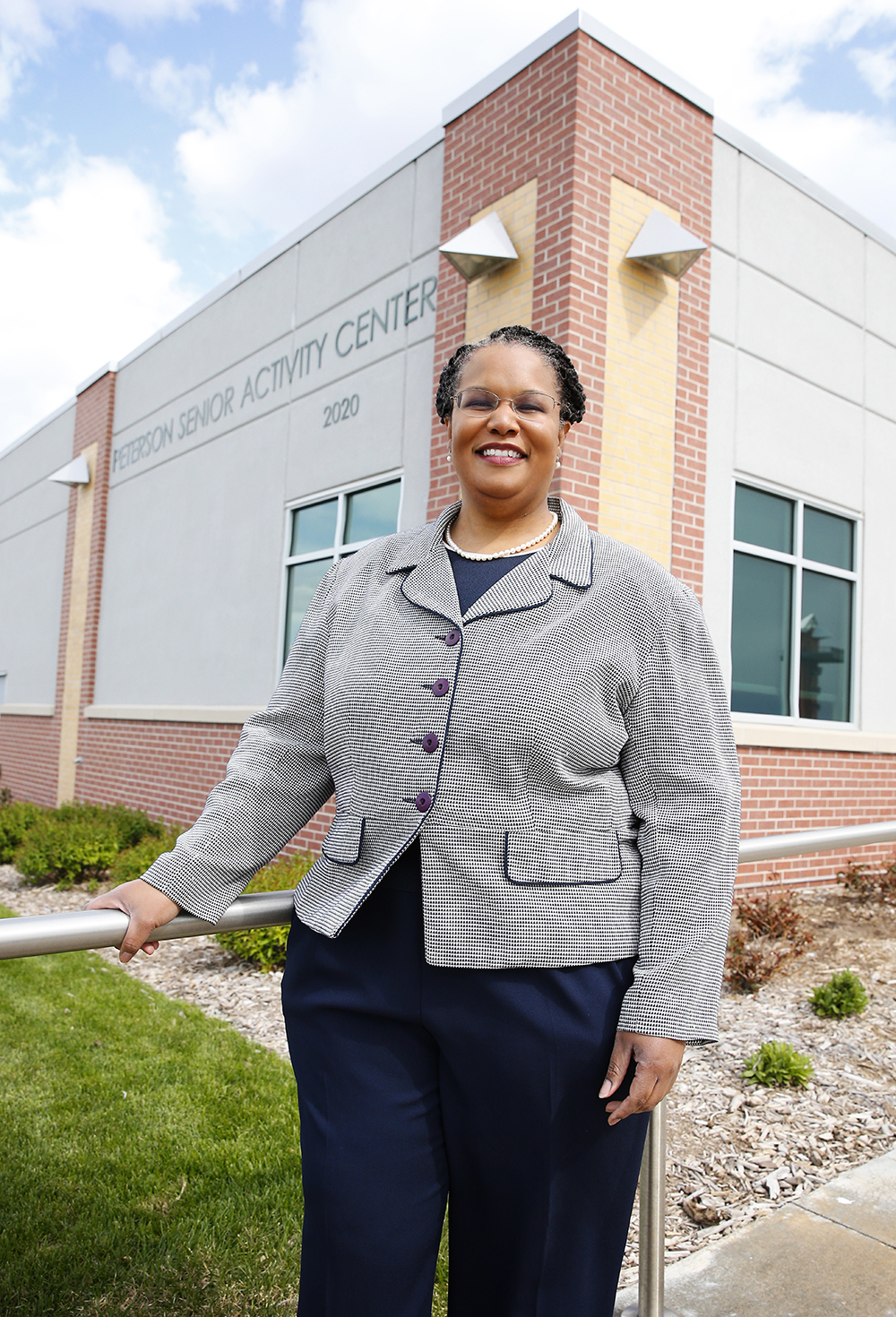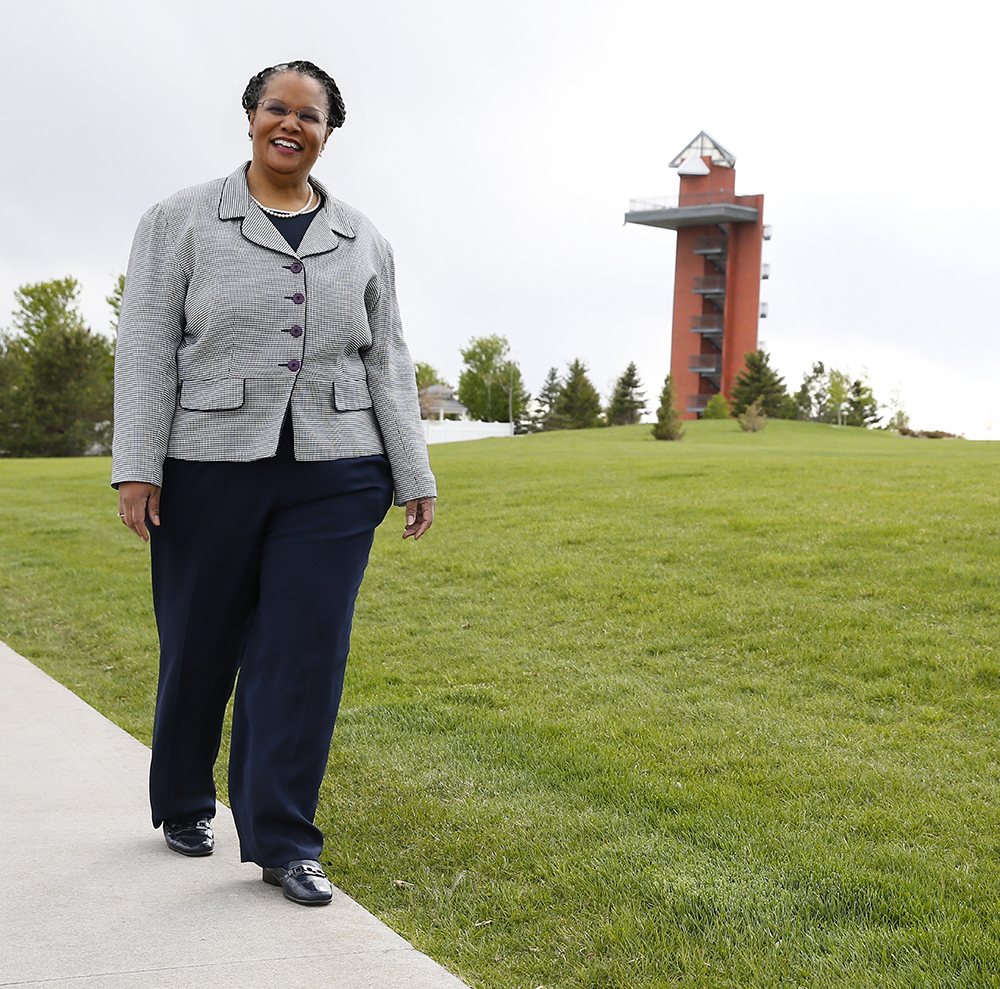By TODD GOTTULA
Director of Communications
Not all families look a certain way.
It is something you learn after so many years of working with children in foster care and social services.
“Many families are separated and divided,” Toni Hill says. “Some are broken, and some are not. But they all look different.”
Currently, Hill is an assistant professor in the Department of Family Studies at the University of Nebraska at Kearney.
Forever, she’ll be an advocate for children and family welfare.
“Helping people is my interest, my passion,” she says. “Awareness and support for children and families will always be a driving force.”
For Hill, those efforts occur in her UNK classrooms, while conducting research on child kinship caregiving and through her volunteer efforts in the community.
It all started in 1990.
After receiving her master’s degree in criminal justice, Hill’s first job was in an Iowa group home, where she worked with young boys.
“I knew from the time I took that very first job that I would work with, and for, children forever. I was immediately passionate about that. No matter what they went through – abuse, neglect, delinquency – in the end they were still little boys who needed guidance.”
It seems like a lifetime ago. But the memories still overwhelm Hill.
“Those kids needed someone to reaffirm them as human beings, someone who showed them care and concern, and someone invested enough to see them through the tough times. You can’t put a salary or title on that.”
Early in her career, Hill saw that schools don’t necessarily want to deal with kids who are troubled or disruptive.
“I knew I had to do all I could to give these kids the best futures possible, even if their families and others around them were not as invested. I saw my role as an advocate for them, a supporter and motivator.”
What is child kinship caregiving?
The research is complex, but the definition is simple, Hill says.
It is primarily grandparents raising and providing care for their grandchildren. It can also include relatives who care for children whose parents are absent, unwilling or unable to effectively parent.
The term kinship care is not limited to an adult caring for a child. It can include any relative caring for another relative, including elderly or disabled family members.
Hill’s research focuses on the evidence and impact of caregiving in various areas.
“Families are our most valuable resource, with many families providing formal and informal caregiving across several generations,” says Hill. “Knowing that caregiving is such a multigenerational issue, I’m expanding my research to look at this more from a lifespan perspective, elder caregiving issues and same generational caregiving.
Approximately 4.4 million U.S. children are parented by their grandparents, and another 1.5 million by other relatives, Hill says.
Some establish guardianship. Some adopt. “And there are other less formal versions that bring different complexities,” Hill says.
Multigenerational kinship caregiving is not a new practice or trend.
“We’ve had it forever. We are just now formally recognizing, giving labels and titles to what people are doing,” explains Hill. The goal of her research is to increase awareness, acknowledge and support family members providing vital care to their relatives.
“When grandma or grandpa show up at school or the doctor’s office, they don’t need to face challenges like ‘why are you bringing your grandchild here.’
“We need to accept the fact they are in a custodial role or co-parenting role. As a society, we need to be prepared to provide services and address those needs. We must accept and realize not all families look a certain way.”
Hill wants people to know there is not a common theme to how and why kinship caregiving surfaces in families. There are a multitude of reasons that drive people into the role: job loss, substance abuse, mental health, divorce and military deployment, among others. “A child has a need. That is the only common theme,” she says.
This is not how Hill imagined her career.
She came to UNK four years ago after receiving her Ph.D. in Family Science at the University of Nebraska-Lincoln.
Her expertise in child welfare and family issues includes 24 years of professional work experience in areas of social services and foster care case management and licensure, child protective services, kinship care and child welfare worker training.
Hill’s research covers various populations and a range of topics that include issues such as domestic violence, intergenerational relationships and her specialty, multigenerational and child kinship caregiving. Numerous scholarly publications and presentations – including eight articles, five book supplements or chapters, more than 35 conference presentations, and multiple manuscript and book reviews – make up Hill’s growing list of research projects.
Noting her years of work outside of academia in the private sector, Hill agrees that her career path is somewhat unique compared to most working in a university setting.
“I did extensive, hands-on work in the field, and I think that enriches the experiences for my students. I can share a real case study or, if we look at an example in the book, I can tell you how this might work out for a family.
“I’m not telling you something I’ve read in a book. I’m talking about things I experienced in the system. I’ve lived it and worked it.”
Hill’s transition from child welfare work to academia wasn’t easy, and it included a series of job changes with different responsibilities and focus. The most notable occurred in 1999 when she left her position as a foster care social worker with Anoka County (Minn.) Human Services to become social services program advisor with the Minnesota Department of Human Services.
“That transition was extremely difficult for me to make. That meant leaving the children in foster care and families caring for them to this transition of actually developing and coordinating training for child welfare workers.”
It also meant moving from the county to state level.
“There was no more hands-on work, but I had a larger impact. When I made that leap from direct care to training people helping the children, it made the later transition to the university classroom easier because I saw the potential of impacting even more people and family welfare issues.”
Adult Aging. Marriage and Family Relationships. Parent Education.
The courses Hill teaches fall in line with her research interests. But there’s one class she holds extra close to her heart.
In 2010, she developed the Intimate Relationship course, a general studies portal course. Three sections are offered each semester, and it also is taught as a Thompson Scholars Learning Community section once a year.
Hill calls the class her “baby.”
“I gave birth to it at UNK, so I definitely strongly identify with the course. I am extremely proud of it and feel a lot of ownership.”
The class is more complex than the name indicates, stresses Hill.
“I tell students the first day of class that it isn’t dating 101. It is the entire spectrum of relationships. We start with the self. Who are you? What is your cultural identity, family of origin? What are your perceptions, communications skills?
“Then we start talking about friendships, dating relationships, mating and marriage relationships, and the complexities that happen such as divorce or being ostracized in a social relationship.”
You will never find Hill simply going through the motions in the classroom. She’s engaged with her students, and constantly making an effort to incorporate her teachings into her research.
“Learning and teaching is very bidirectional. I am never the vessel giving or pouring knowledge out into the world. I learn from my students and partnerships I have in the community. It’s not about me or the textbook. It’s about the communities we live in and the resources students bring to the classroom and field.”
GRANDPARENTS, GRANDFAMILIES
Defining family can be very difficult. Hill regularly asks her UNK students to do just that.
The task seems simple. However, students often return to the next class looking perplexed.
It is a complex issue, says Hill, because today’s familial relationships and structures are dynamic and changing.
Parent-child relationships continually change over time, with caretaking responsibilities typically being reduced as the child enters adulthood.
Hill’s research explores issues related to various forms of family caregiving and the impact on intergenerational relationships.
Her latest article on the topic is a textbook supplement, “Grandparents and Grandfamilies.”
Published this year, the supplement appears in the book “Marriages and Families: Intimacy, Diversity, and Strengths,” authored by one of Hill’s mentors, John DeFrain. The book is in its eighth edition and considered by many as one of the top marriage and family textbooks in the nation.
DeFrain, a retired family studies professor at UNL, is an internationally-renowned researcher on family strengths.
“Honored and overwhelmed with excitement. That’s really the only way to describe my reaction to being included,” Hill says. “John DeFrain is so accomplished. It means a lot that he would consider my work for inclusion in what he’s doing.”
Whether it’s the latest book supplement for DeFrain or an upcoming project, Hill notes that her research rarely strays from her knowledge and interest in kinship caregiving. That includes deeper examination of what families give up to provide this care, which they often provide regardless of their income, education, or their own health issues.
“There are health, social and economic consequences for these families. They aren’t doing it without sacrifice. The families have challenges already, and they don’t need anymore.
“I want people to know and appreciate the value of multi-generational families, and grandparents or other relatives serving in these roles,” she says.
Hill’s advice to first-time or young researchers is simple.
“Find your passion. I was fortunate to have mentors and an adviser that let me find my research topic. That’s not always the case. Some students walk in the door and they are handed their research stream. I was respected in that process and allowed to establish and find something I was passionate about.”
Hill developed her passion for kinship caregiving somewhat unexpectedly.
“I wasn’t conscious of it, but seeing families separated and divided, and all the other things I saw in the field, had an impact.”
By the time Hill entered grad school, she had zeroed in on child kinship caregiving. One person in particular, University of Minnesota Professor Priscilla Gibson, fed her research interest.
“During the course of my professional work, I was exposed to and partnered with many wonderful researchers. Priscilla Gibson stood out.
“Her focus, interest and passion really stuck with me. I had no idea at the time that I would follow her path, but that’s what happened.”
Finding motivation to conduct research is easy, says Hill, who is working to earn tenure.
“I am thirsty. I’m in a position at UNK where I have to be thirsty and can’t afford to rest on my laurels. I am an assistant professor on a tenure track, and people are literally counting my publications.
“Whether I want to count them or not, someone is counting them, and they are counting them annually in terms of peer reviews, departmental and college level reviews and beyond. The goal is to get promoted and tenured, and there’s no gray area there.”
Tenure often dictates the research topics Hill chooses to address.
“I have several years worth of plans and ideas I want to pursue, but the reality is that sometimes opportunity knocks through an email or phone call,” she says. “Being a new researcher and pre-tenure, I’ll take those. Opportunity and reality run side by side in my world.”
Increasing academic visibility and growing an already strong record of published research is motivation for Hill. But that focus on tenure is only part of what drives her.
“My real motivation comes internally, knowing there is a connection between my research, human beings and real issues that families address daily. My area of research is something I truly still love.
“Many families don’t have the time or avenue to make sure their voices and struggles are heard. That connection between research and practice is vital to me.”
Hill says her place in society as an African-American woman often defines her work.
“My lens is unique in that way and gives me different insight at times. I often think very globally,” she says. “I am an African-American from a communal-focused culture. It is not about a linear process where resources go to the next generation. In my community it is a communal process based on who has the resources. While that’s not unique to African Americans, it certainly includes African Americans.”
Hill finds all aspects of a research project rewarding and enjoyable.
“I love the fact gathering and questions that go into research. I love it all, from inception to the development process of forming questions and identifying populations I’m going to look at, and where I want to look.”
The writing stage, she admits, is usually her biggest challenge.
“I love writing. Let me loose with a pen,” she chuckles. “But carving out the time to write is so difficult. I can’t just skip a committee meeting or not teach class because I’m in a writing mood. Rarely can I just stop, process and write all day.”
Voluntarism and community involvement, above all else, keep Hill grounded. She is involved with Kearney Dawn Rotary Club and serves on the Walk to End Alzheimer’s committee, Prairie View Gardens Advisory Board and Community Coalition to Improve Alzheimers/Dementia Health.
As part of her volunteer work, Hill helped secure fellowships and write grants totaling several thousands for UNK-sponsored research programs, Alzheimer’s research and similar community projects and events.
“Community service comes to me as natural as breathing. I feel it’s my responsibility to give back and be involved. I wake up and think about that component every day. It’s something I really enjoy,” Hill says.
In 2009, Hill lost her stepfather, Charles, to complications from Alzheimer’s disease. He fought the disease for five years. The pain of watching her stepfather suffer memory loss and lose his independence remains today.
“It forever changed my life to experience that with my family,” Hill says softly.
Tears flow from her eyes. It’s not an easy conversation.
“I was very close to my stepdad,” she continues after a long pause. “It is an honor to give back. The memories of my stepfather are with me every day.”
Her stepfather’s death also serves as motivation to expand her research to include other caregiving issues, not just those involving young children. “He will always be a driving force for me in terms of community service and my research.”
Personal experience has not only shaped Hill’s research interests, but also her personality.
Her self-described strong work ethic, compassionate personality and happy demeanor come from strong family relationships and being raised in north Omaha.
“I’m very proud of where I come from,” says Hill, an Omaha Central graduate. “I am a very happy person. I hope people see me as pleasant, a person who is always smiling. That’s the way I’ve been all my life, and it goes back to my childhood and being raised in Omaha surrounded by wonderful family and friends.”
Hill’s mother, Gloria, was a civil employee with the federal government for 33 years at Offutt Air Force Base. Her stepfather was a welder. She has an older sister and younger brother.
Family time, says Hills, was always a focus.
“I am humbled by the fact that my parents, despite modest incomes, always found a way to take summer family vacations.
“In hindsight, I am not sure how they did it. As a kid, you don’t figure out that mystery. You just wonder where you’re going each year. My parents valued that family time, and they always found a way.”
Not all families, including many Hill studies, have the same success stories.
“Again, supporting children and helping families is my interest and passion. It drives my research.”
The interest is personal.
And genuine.
 Toni Hill
Toni Hill
Title: Assistant Professor, Department of Family Studies and Interior Design
College: College of Business and Technology
Education: Bachelor of Science in Journalism, University of Nebraska at Omaha, 1987; Master of Science in Criminal Justice, UNO, 1989; Ph.D. in Family Science, University of Nebraska-Lincoln, 2010
Years at UNK: Four
Career: Worked 15 years in Iowa, Minnesota and Nebraska in areas of child protective services, foster care case management and licensure, and child welfare worker training. … Returned to college in 2004 to complete a Ph.D. … Taught family studies courses at UNO and UNL before coming to UNK in 2010.
Hobbies/Interests: Leisure travel, photography, videography, community volunteer, Kearney Dawn Rotary Club, Walk to End Alzheimer’s committee, Prairie View Gardens Advisory Board member, Community Coalition to Improve Alzheimers/Dementia Health.
Areas of research/specialization: Multigenerational Kinship Caregiving.
Courses taught: In 2010, developed the Intimate Relationship course, a general studies portal course. There are currently three sections of the course being offered every semester, and it is also taught as a Thompson Scholars Learning Community section once a year.
Others include: Adult Aging, Marriage and Family Relationships, Parent Education and Home Visitation in support of the Family Studies and Early Childhood Education partnership.
Recent Published Articles:
• Journal of Justice Studies: “Diverse Support: Examination of the Social Issues Impacting Child Kinship Caregivers,” 2014
•Article: “Keeping the kinship village: Legal and policy aspects of child kinship care,” 2013
• Article: “Keeping Kin: An analysis of child kinship care literature,” 2011
• Book Supplement: “Grandparents and grandfamilies” in “Marriages and families: Intimacy, diversity, and strengths,” 2013
• Book Chapter: “Definitions and Developments of Kinship” in “The Encyclopedia of Family Studies.” (accepted 2013)
• Book Chapter: “Foster Care, Kinship Care, and Divorce,” in “Cultural Sociology of Divorce: An Encyclopedia,” 2013
-30-






Great job with the article. I am very proud of you Toni. Keep up the good work
Great article. So proud of you, Toni…what an amazing woman, mentor, and example you are!
What a great piece! Proud to be your colleague and a fellow Rotarian! – Sri